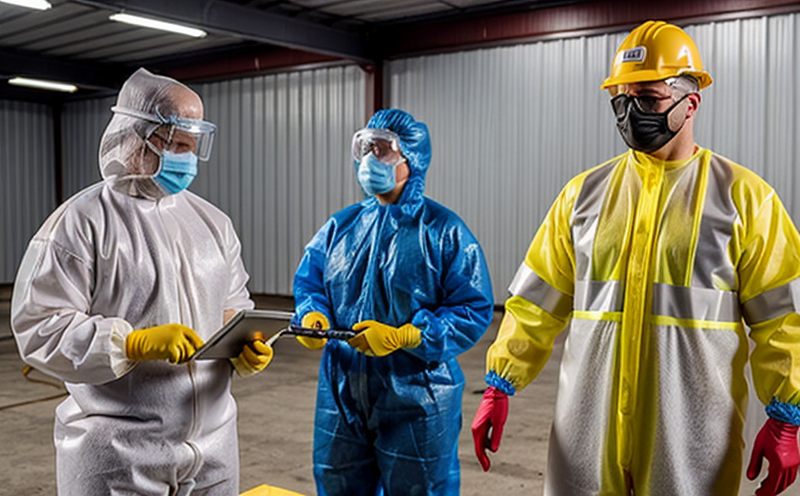CSA Z195 Protective Footwear Slip Resistance Testing
The CSA Z195 standard is a critical benchmark for ensuring that protective footwear provides adequate slip resistance under various working conditions. This standard is particularly important in sectors where workers are exposed to wet or contaminated surfaces, such as construction sites, chemical plants, and food processing facilities. Compliance with this standard ensures the safety of employees by reducing the risk of slips, trips, and falls.
CSA Z195 specifies that footwear must meet certain criteria regarding slip resistance on defined test surfaces. The standard includes both static and dynamic testing methods to evaluate the footwear's performance against slipping on wet or contaminated surfaces. Static tests measure the maximum force required to initiate slip between the shoe sole and a defined surface, while dynamic tests assess how well the footwear performs under more realistic walking conditions.
For this test, the specimen preparation involves selecting appropriate test shoes that are representative of the intended use. The footwear is then subjected to rigorous testing on various surfaces designed to simulate real-world scenarios. These surfaces include water, oil, and other contaminants, which can significantly affect slip resistance. The instrumentation used in these tests includes specialized equipment capable of accurately measuring the force required to initiate a slip.
The reporting process for CSA Z195 involves documenting all test parameters, including the type of surface tested, the footwear model, the results of both static and dynamic tests, and any relevant observations. This comprehensive report is essential for quality managers and compliance officers to ensure that the protective footwear meets regulatory requirements and provides adequate slip resistance in various environments.
Understanding the real-world implications of CSA Z195 testing is crucial for R&D engineers and procurement teams. By ensuring that footwear meets these standards, companies can protect their employees from injuries caused by slips and falls. This not only enhances worker safety but also supports a positive company image as an employer committed to occupational health and safety.
The standard's importance cannot be overstated in sectors where the risk of accidents is high. Compliance with CSA Z195 helps organizations meet regulatory requirements while also improving operational efficiency by minimizing downtime due to accidents or injuries. For quality managers, this testing ensures that the products they approve are safe for use in hazardous environments.
In summary, CSA Z195 protective footwear slip resistance testing is a vital service that plays a crucial role in ensuring worker safety across various industries. By adhering to this standard, companies can significantly reduce the risk of slips and falls, thereby enhancing overall workplace safety and compliance with regulatory requirements.
Why It Matters
The importance of CSA Z195 protective footwear slip resistance testing cannot be overstated. In industries where workers are exposed to wet or contaminated surfaces, the risk of slips, trips, and falls is significantly higher. These accidents can lead to severe injuries, including sprains, fractures, and even fatalities.
CSA Z195 specifies that protective footwear must provide adequate slip resistance on various test surfaces, ensuring that workers can safely navigate hazardous environments. This standard helps prevent workplace accidents by validating the performance of footwear in real-world conditions.
The testing process involves rigorous evaluation using both static and dynamic tests to assess how well the footwear performs under different walking scenarios. These tests simulate actual working conditions, providing a comprehensive assessment of the footwear's slip resistance capabilities.
By adhering to CSA Z195, companies can ensure that their protective footwear meets regulatory requirements and provides adequate protection for workers in hazardous environments. This not only enhances worker safety but also supports a positive company image as an employer committed to occupational health and safety.
Industry Applications
- Construction Sites: Workers on construction sites often encounter wet or contaminated surfaces, increasing the risk of slips, trips, and falls. CSA Z195 testing ensures that protective footwear meets slip resistance standards in these environments.
- Chemical Plants: Chemical plants have a high risk of spills and contamination, making slip-resistant footwear essential for worker safety.
- Food Processing Facilities: These facilities often have wet or slippery floors due to the nature of food processing. CSA Z195 testing ensures that workers can safely navigate these environments without risking injury.
- Mining Operations: Mining sites can be hazardous due to loose materials and uneven surfaces, making slip-resistant footwear a critical safety measure.
- Petrochemical Plants: Workers in petrochemical plants face the risk of exposure to various contaminants, requiring protective footwear that meets CSA Z195 standards.
In addition to these sectors, any industry where workers are exposed to wet or contaminated surfaces can benefit from CSA Z195 testing. This ensures that protective footwear provides adequate slip resistance in real-world conditions, reducing the risk of accidents and injuries.
Eurolab Advantages
At Eurolab, we offer comprehensive CSA Z195 protective footwear slip resistance testing services tailored to meet the specific needs of your organization. Our team of experts ensures that all tests are conducted in accordance with the latest standards and guidelines.
We provide accurate and reliable test results through our state-of-the-art equipment and experienced technicians. Our facility is equipped with specialized instruments capable of measuring both static and dynamic slip resistance, ensuring precise and consistent testing outcomes.
Our commitment to quality extends beyond just conducting tests; we also offer expert advice on how to improve the slip resistance of your protective footwear. This includes recommendations for material selection, sole design, and other factors that can enhance performance.
In addition to our technical expertise, Eurolab offers a range of services to support your compliance efforts. From initial consultation to final reporting, we provide a seamless testing process that meets all regulatory requirements.





